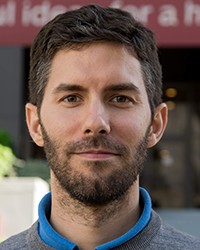- Online
- August 5 – 8, 2024
- $2,600
Implementing Health Care AI into Clinical Practice
Overview
Equipping Clinicians to Implement Successful AI Solutions in Health Care
As artificial intelligence and machine learning emerge as powerful tools to transform patient care, organizations seek professionals skilled in applying these technologies within clinical settings.
The successful implementation of AI solutions in clinical practice requires teams that are skilled in multiple disciplines, including data science, user-centered design, subject-matter expertise, change management, and more. However, the health care field currently lacks professionals who sit at the intersections among those disciplines. This executive education program equips clinicians and executives with the cross-disciplinary knowledge and skills needed to ensure AI solutions are implemented successfully in clinical practice.
Take the Next Step in Your Career Evolution with the
Business Applications for AI in Health Care Certificate of Specialization
Implementing Health Care AI Into Clinical Practice contributes to the Business Applications for AI in Health Care Certificate of Specialization, designed for all health care stakeholders, from the doctor’s office to the business suite. To obtain your Certificate, choose two of three online programs created and taught by Harvard Faculty and pioneers of AI in health care to prepare you for the future of an ever-changing health care industry.
For more information, visit our Business Applications for AI in Health Care Certificate of Specialization page.
Through case studies, small group discussions, and interactive sessions led by Harvard faculty, participants will gain hands-on experience in each step of the AI implementation process. Topics include understanding and defining the problem at hand, as well as tailoring potential solutions to address the problem and meet user needs. Participants will learn how to find relevant data, deploy effective feature engineering, select the appropriate evaluation metrics and model type, design an effective implementation, and develop an iterative mindset for solution building.
Implementing Health Care AI into Clinical Practice will focus on four key pillars: workflow assessment and system engineering; accuracy evaluation and model selection; MLOps: model deployment and maintenance; and change management.
This program builds upon AI for Health care: Concepts and Applications. Both courses can be taken independently; however, to earn the Business Applications for AI in Health Care Certificate of Specialization, you must take two of three programs in our health care AI portfolio. Without a strong background in AI, it is recommended that you take AI for Health Care: Concepts and Applications before either Care or Implementing Health Care AI in Clinical Practice or Innovation with AI in Health Care as AI for Health Care: Concepts and Applications covers more foundational concepts upon which the other two programs build.
Objectives & Highlights
Learning Objectives
- Analyze clinical workflows with a focus on the clinical decision that can be improved with AI, and design new AI-enhanced workflows
- Understand the nuances of different metrics to assess the performance of different AI models for specific use cases
- Grasp the concepts of MLOps and machine learning model deployment
- Identify the potential for model drift and how to account for it in a model maintenance plan
- Plan and conduct change management for AI-powered process changes
- Identify what team members—data engineers and scientists, MLOps specialists, and others—you need to fully implement a clinical AI project
Program Highlights
- Hear from experts in the implementation of AI into clinical practice, from health care institutions to health care tech CEOs
- Work through a real-world case study with the guidance of experts in the implementation of AI solutions into clinical practice
- Network with like-minded leaders from across the world through small group discussions in an interactive virtual environment.
Upon completion of this course, participants will be able to:
- Analyze a health care problem that may be solved with AI by using design principles
- Describe the different stages of AI development and implementation, and what skills are needed to successfully advance the project
- Identify necessary professional skills required in a successful health care AI team
- Guide a multidisciplinary team through the process of developing and implementing an AI solution into clinical practice
- Design a plan that includes the different elements of an AI health care project: workflow analysis, data and modeling, deployment and change management
Credits and Logistics
Continuing Education Credit
The Harvard T.H. Chan School of Public Health is accredited by the Accreditation Council for Continuing Medical Education (ACCME) to provide continuing medical education for physicians.
The Harvard T.H. Chan School of Public Health designates this live activity for a maximum of 15 AMA PRA Category 1 Credits™. Physicians should claim only the credit commensurate with the extent of their participation in the activity.
Harvard T.H. Chan School of Public Health will grant 1.5 Continuing Education Units (CEUs) for this program, equivalent to 15 contact hours of education. Participants can apply these contact hours toward other professional education accrediting organizations.
All credits subject to final agenda.
Successful completion of this CME activity, which includes participation in the evaluation component, enables the participant to earn up to 15 MOC points in the American Board of Internal Medicine’s (ABIM) Maintenance of Certification (MOC) program. It is the CME activity provider’s responsibility to submit participant completion information to ACCME for the purpose of granting ABIM MOC credit.
Faculty
Current faculty, subject to change.
Santiago Romero-Brufau, MD, PhD
Program Director
August 5 – 8, 2024Department of Otolaryngology — Head and Neck Surgery
Mayo Clinic
Adjunct Assistant Professor
Department of Biostatistics
Harvard T.H. Chan School of Public Health
Peter Noseworthy
Faculty
August 5 – 8, 2024Division of Heart Rhythm Services
Mayo Clinic- Rochester
Joshua Wesley Ohde, PhD
Faculty
August 5 – 8, 2024Center for Digital Health, AI Enablement
Mayo Clinic- Rochester
Alexander Jay Ryu, MD
Faculty
August 5 – 8, 2024Department of Medicine and Innovation Committee Chair
Mayo Clinic- Rochester
John Guy Skiffington, BS
Faculty
August 5 – 8, 2024Mayo Clinic Center for Digital Health
Mayo Clinic- Rochester
Agenda
August 5 – 8, 2024
All Times are Eastern Time (ET).
| Monday, August 5, 2024 | ||
|---|---|---|
| 9:00–10:15 am | Romero-Brufau | Introduction - Health Care AI as the Science of Decisions |
| 10:15–10:30 am | Break | |
| 10:30–11:45 am | Ohde | Workflow Mapping |
| 11:45 am–12:30 pm | Lunch | |
| 12:30–2:00 pm | Romero-Brufau, Ryu | Guided Team Project: Workflow Map | Tuesday, August 6, 2024 |
| 9:00–10:15 am | Romero-Brufau | Accuracy Metrics |
| 10:15–10:30 am | Break | |
| 10:30–11:45 am | Romero-Brufau | Model Selection |
| 11:45 am–12:30 pm | Lunch | |
| 12:30–2:00 pm | Romero-Brufau, Ryu | Guided Team Project: Accuracy Metrics and Model Discussion | Wednesday, August 7, 2024 |
| 9:00–10:15 am | Skiffington | ML-Ops and Architecture Design |
| 10:15–10:30 am | Break | |
| 10:30–11:45 am | Noseworthy | Case study: Heart Rhythm AI |
| 11:45 am–12:30 pm | Lunch | |
| 12:30–2:00 pm | Romero-Brufau, Ryu | Guided Team Project: ML-Ops and Model Maintenance | Thursday, August 8, 2024 |
| 9:00–10:15 am | Romero-Brufau | Study Design and Change Management |
| 10:15–10:30 am | Break | |
| 10:30–11:45 am | Romero-Brufau, Ryu | Guided Team Project: Change Management Plan and Study Design |
| 11:45 am–12:30 pm | Lunch | |
| 12:30–2:00 pm | Romero-Brufau | Course Summary and Q & A |
This agenda is subject to change.
back to topWho Should Participate
This online program is designed for clinicians, administrators, and executives who are responsible for implementing AI solutions in their organization.
Participants will come from a range of organizations including health care delivery (hospitals, clinics, primary care systems, and other health care delivery companies or institutions), health care technology, payers, and governments. Some titles represented in the program will include:
- Clinician
- Physician Leader
- Chief Executive Officer
- Chief Information Officer
- Chief Innovation Officer
- Chief Medical Informatics Officer
- Chief Medical Officer
- Data Scientist
- Director
- Innovation Specialist
- Implementation Specialist
- Product Manager
This program is designed for those who have either a background in data science or a general understanding of how artificial intelligence works; as well as a general understanding of the health care system. It is recommended that those with no artificial intelligence background or knowledge take the first program in the AI Certificate of Specialization series, AI for Health Care: Concepts and Applications, before enrolling in this program.

